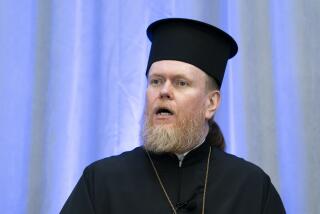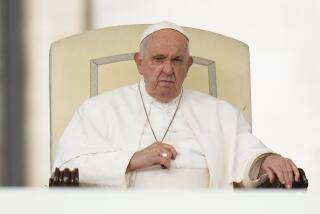Polish Regime Spokesman Calls for New Laws to Curb Church Attack on Atheism
- Share via
WARSAW — The Polish government spokesman, in a statement likely to put a further chill on church-state relations, called Monday for changes in the country’s legal code to place atheism on an equal footing with religion.
Writing under a pseudonym that he has used for years, spokesman Jerzy Urban criticized clergymen who blame “godlessness” for crime in Poland, particularly the murder of Father Jerzy Popieluszko. The unofficial chaplain of the outlawed Solidarity union, Popieluszko was killed in October by members of the secret police.
Urban, who is a close adviser to the Polish leader, Gen. Wojciech Jaruzelski, said church assaults on atheism amount to “clerical chauvinism and expansionism.” He added that “our legislation should be adjusted to this new situation” to protect atheist points of view from public attack.
‘Untruth, Intolerance’
“Sermons claiming that a godless world outlook leads to crime and dishonesty . . . disseminate untruth and instill hatred and intolerance,” Urban wrote under his customary pseudonym, Jan Rem.
“Religiousness is protected, and the abuse of the church for generating bitterness against atheism, as well as for slandering it, is unfortunately tolerated.”
Poland is 90% Roman Catholic, and the church, as even government officials lament in private, enjoys far greater prestige than the Communist authorities.
Urban did not spell out any legislative changes the government might be considering, a vagueness that made the statement seem more a threat than a concrete plan.
His commentary appeared in all major newspapers and was carried by the official Polish news agency PAP, a form of saturation coverage apparently designed to give added weight to the threat.
This was the second such attack by government officials on the church in three days. Both followed an unusually long, six-day visit to Poland by the propaganda chief of the Soviet Communist Party, Boris I. Stukalin, who left Warsaw on Saturday.
Stukalin, who holds a broad range of ideological powers, was said by the Polish news agency to have discussed “propaganda work” with the heads of the Polish Central Committee sections in charge of radio, television, press and ideology; the editorial staff of Trybuna Ludu, the leading Communist Party newspaper; the Communist Party chief of Warsaw, and members of the ruling Politburo.
The Soviet official’s extensive contacts with party officials in charge of the news media almost certainly touched on what has for the East Bloc been unusually detailed and straightforward coverage of the trial in Torun of four secret police officers accused of Popieluszko’s murder. The trial has cast unprecedented light on activities of the secret police against the church, an exposure that is believed to have alarmed the Soviets.
Last Saturday, the day Stukalin returned to Moscow, the Polish government’s minister for religious affairs, Adam Lopatka, said in a published interview that the Roman Catholic Church hierarchy is too tolerant of militant priests.
“Political anti-state activities of some of the clergy . . . still exist to a rather broad extent,” Lopatka said in an interview published in the official government newspaper Rzeczpospolita.
More to Read
Sign up for Essential California
The most important California stories and recommendations in your inbox every morning.
You may occasionally receive promotional content from the Los Angeles Times.










